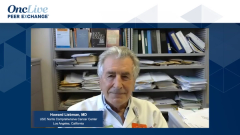
Treating Patients With Immune Thrombocytopenia in the Era of COVID-19
A brief review of how the management of patients with immune thrombocytopenia has been impacted by the COVID-19 pandemic.
Episodes in this series

Transcript:
Morey Blinder, MD: Let me just ask one quick question about COVID-19–related ITP [immune thrombocytopenia], and that is about people who have stable ITP and the effect on the vaccine. I know there’ve been a couple of recent series published at ASH [American Society of Hematology Annual Meeting and Exposition] looking at relapses of ITP after COVID-19 vaccine. I asked this question to one of the speakers at ASH myself, and would this be a reason not to vaccinate somebody if they were particularly concerned about relapsed ITP? Have you had to manage anybody with relapsed ITP in the setting of COVID-19 vaccine? I’ll ask anybody if they have any experience, and then we’ll move on.
Howard Liebman, MD: Well, I can bring up the fact that I contributed to the paper in Blood of the series. We have an ongoing issue. I still tell my patients they should get vaccinated. I think the number if you look at the paper, is about 8% to 9% will have that relapse. They’ll drop below 3000 [platelets]. Every single case, including a patient that I treated 11 years previously with azathioprine, a man who went into long-term remission, got his vaccination and dropped to 2000 [platelets]. He lives in northern California. It took us a while, but working with his physician up there, he actually came down here because they were having trouble even keeping his platelet count above 5000. So, he basically had his son drive him down here with 2000 platelets and we admitted him and got his platelets up. He obtained another remission. We’ve had every patient who’s dropped their platelets, in remission. We had a patient with Evans [syndrome] who reactivated her autoimmune hemolytic anemia that had been in remission for 20 years after splenectomy. We followed her because she relapses. She’s back in remission. We had a patient with lupus ITP who was very refractory initially, and that patient has also recovered. So, I think I still encourage vaccination, and all the patients who do drop their platelet counts develop antibodies. They have a strong immune response against the vaccine. They don’t lose those antibodies even when you’re trying to treat them to put them back in remission, interestingly enough.
Morey Blinder, MD: How did you treat them for first-line therapy?
Howard Liebman, MD: First-line therapy works. IVIG [intravenous Immunoglobulin] and steroids, and that worked in most of them. I have not had to use rituximab in any. In the most refractory case though, we did use high doses of a TPO [thrombopoietin receptor] agonist. It was in-house, 10 μg/kgof romiplostim, IVIG over several days, and dexamethasone, and then put the patient on mycophenolate for a while afterward, as we induced the steroids and went into remission.
Morey Blinder, MD: Danny, do you have any experience with post–COVID-19 vaccine ITP relapse?
Daniel Landau, MD: Yes. Probably not as much experience as Howard, but 1 very difficult-to-treat patient comes to mind who was very stable prior to a COVID-19 vaccination. Received the vaccine, and within days, if not a week or so, actually wound up hospitalized with a platelet count of 1 or 2 that was refractory to just about everything under the sun. Now, it took time. It took time and a lot of therapy. We followed a very similar course with high doses of steroids, high IVIG, and a high dose of romiplostim. But ultimately, he came out of it and is doing just fine now.
Morey Blinder, MD: I have a similar experience to both, a couple that are fairly easy to treat. A couple that have been very refractory taking months to get them back in their remission. Let me, lastly, ask Cindy about this. Have you seen de novo ITP or relapsed ITP after the COVID-19 vaccine? Perhaps there are not quite as many vaccines in the pediatric age yet, but any experience?
Cindy Neunert, MD: I haven’t seen de novo after vaccine. We did have a couple of pieces of de novo following the actual COVID-19 infection, but not the vaccine. I’ve had a couple of my patients with ITP who paradoxically had a slight boost in their platelet count following the vaccine as well. I think it’s obviously the pediatrician in me that always recommends vaccines and it would take a lot for us to suggest otherwise because as I say to families, if you end up with COVID-19, we’re going to be battling a lot more than just the thrombocytopenia, and we can manage the thrombocytopenia. The pediatric voices are still encouraging vaccines.
Howard Liebman, MD: Yes. I’ll comment one additional thing. We had 2 cases of de novo ITP post vaccination. We were able to track down prior records on 1 of the patients. Her platelet counts were running about 120,000 for years. This had been suggested in some of the previous publications that it might be that we were just uncovering mild cases of ITP. The second case, although we don’t have any back records, was one of the patients actually who we also screened that was de novo that was also Hpylori [Helicobacter pylori] infected. So, I don’t know whether that was a setup for the event, but both of them actually responded much easier than the patients with relapsed ITP that we saw.
Morey Blinder, MD: I think this does add just more complexity to the picture, but an interesting subset of ITP say.
Transcript edited for clarity.











































